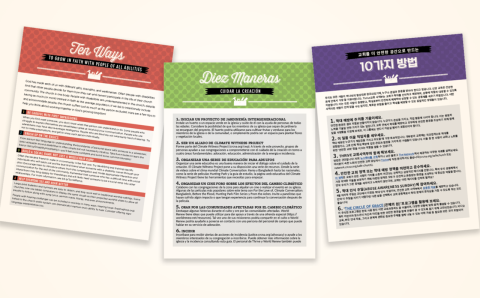Pastor Jim had always prided himself on his tireless dedication to his congregation. But one evening, as he prepared yet another sermon late into the night, his young son walked into his study and climbed onto his lap. "Daddy, when do you rest?" the boy asked. Pastor Jim hesitated, realizing he had been preaching about Sabbath but never practicing it himself. That weekend, for the first time in years, he took a full day off—no emails, no meetings, just time with his family and in quiet prayer. He discovered that slowing down didn’t weaken his ministry; it deepened it, allowing him to lead from a place of renewal rather than exhaustion.
In our age of relentless acceleration, the call to slow down might seem counterintuitive. Speed is celebrated, productivity is idolized, and busyness has become a badge of honor. Yet Scripture calls us to a different pace—one rooted in the rhythms of grace rather than the demands of culture. To slow down is to realign ourselves with the cadence of God’s kingdom, where rest and restoration are not luxuries but divine mandates.
The Theology of Slowing Down
The act of slowing down is not merely practical; it is profoundly theological. It challenges the idols of our age—efficiency, control, and achievement—and reorients us toward the sovereignty of God. At its core, the practice of slowing down is an embodied act of trust. When we pause, we acknowledge that the world is upheld not by our striving but by the Creator’s sustaining hand.
The creation account itself reveals God’s intention for rest. After six days of creative work, God ceased and sanctified the seventh day, declaring it holy (Gen. 2:2-3). This Sabbath rhythm was not born out of necessity but God’s divine generosity—a gift to humanity to reflect, worship, and delight in the Creator. Yet how often do we reject this gift, driven by the false belief that rest is unproductive or indulgent?
In slowing down, we resist the world’s lie that our worth is tied to what we produce. Instead, we return to the foundational truth of our identity: we are not human doings but human beings, created in the image of a God who works and rests.
The Cultural Cost of Speed
Our modern obsession with speed has deeply spiritual consequences. Theologian Marva Dawn describes it as living under the “tyranny of the urgent,” where life becomes a series of tasks to accomplish rather than a gift to steward. This frenetic pace fractures our attention, diminishes our capacity for meaningful relationships, and numbs us to the presence of God.
Consider Jesus’ words in Matthew 11:28-30:
"Come to me, all you who are weary and burdened, and I will give you rest. Take my yoke upon you and learn from me, for I am gentle and humble in heart, and you will find rest for your souls. For my yoke is easy and my burden is light."
This invitation is not to a hurried faith but to a life shaped by Christ’s gentleness and humility. The imagery of the yoke suggests not only guidance but also a shared pace. Jesus walks with us, not in a rush but in step with the Father’s will.
Slowing Down as a Spiritual Discipline
Slowing down is not a passive withdrawal from the world but an active participation in God’s sanctifying work. It is a spiritual discipline that cultivates attentiveness to God’s presence in the ordinary. The Psalms repeatedly invite us to “wait on the Lord” (Ps. 27:14, Ps. 37:7). This waiting is not idle; it is a posture of expectant hope, trusting in God’s timing rather than our own.
When we slow down, we open ourselves to the Spirit’s transformative work. We begin to notice the sacredness of small moments—a kind word, the beauty of creation, the taste of bread and wine at the Lord’s table. These moments, often overlooked in the rush of life, become windows into the kingdom of God.
A Prophetic Witness
To slow down is also to offer a prophetic witness in a culture enslaved to speed. It declares that the kingdom of God operates on a different economy—one not driven by scarcity but by abundance. The story of manna in the wilderness (Exodus 16) illustrates this truth. God provided daily sustenance for the Israelites, teaching them to trust his provision rather than hoard out of fear.
Similarly, slowing down is an act of resistance against the myth of scarcity. It proclaims that there is enough time, enough grace, enough of God’s presence for the day. It is a declaration that our hope is not in what we achieve but in who God is.
Practical Theology: Living at God’s Pace
Slowing down requires intentional choices that align with God’s rhythm. This might mean reclaiming the Sabbath as a day of worship and rest, setting boundaries around technology, or practicing silence and solitude. It might involve rethinking our relationship with time—not as something to manage but as a gift to care for.
In her book Sacred Rhythms, Ruth Haley Barton writes, “We are starved for solitude because we are always trying to cram more and more into less and less time.” Yet solitude is where we meet God and rediscover who we are in his sight. It is in the stillness that we hear his whisper (1 Kings 19:12).
A Call to the Church
As the body of Christ, the church has an opportunity to model this countercultural rhythm. Corporate worship itself is a slowing down—a communal pause to re-center on God’s story. By creating spaces for Sabbath, silence, and deep relational connection, the church can offer a foretaste of the eternal rest promised in Christ.
In a world driven by urgency, the church is called to be a people marked by patience, presence, and peace. This is not a call to disengagement but to a deeper engagement with God’s work in and through us.
Conclusion: The Gift of Slowing Down
Slowing down is not merely a lifestyle adjustment; it is a theological declaration. It proclaims that our identity is found not in what we do but in who God is. It invites us to step off the treadmill of busyness and into the unforced rhythms of grace.
In a hurried world, slowing down is a radical act of faith—a testament to the sufficiency of God’s grace and the abundance of his provision. It is an invitation to live fully present, deeply connected, and joyfully aligned with the Creator’s design.
Let us, as followers of Christ, embody this rhythm of rest and restoration, bearing witness to a world in desperate need of the sacred gift of slowing down.
Discussion Questions
- How does our culture’s obsession with speed and productivity affect our spiritual lives and relationships with God? In what ways have you experienced this personally?
- What does it mean to trust in God’s provision and timing when we choose to slow down? How does the story of manna in the wilderness (Exodus 16) challenge our modern mindset?
- Jesus invites us to take his yoke and learn from him (Matt. 11:28-30). How does this image shape your understanding of rest and slowing down in the context of discipleship?
- In what ways can the church serve as a prophetic witness to a hurried world by modeling rhythms of rest, Sabbath, and intentional slowing? How can you contribute to this within your faith community?
- Slowing down is described as an act of resistance and trust. What practical steps can you take to embrace this countercultural rhythm in your daily life, and how might it deepen your relationship with God?
About the Author
Youngkhill Lee, of Grand Rapids, Mich., is a professor of kinesiology at Calvin University, specializing in therapeutic recreation. He worships at Calvary Church.









